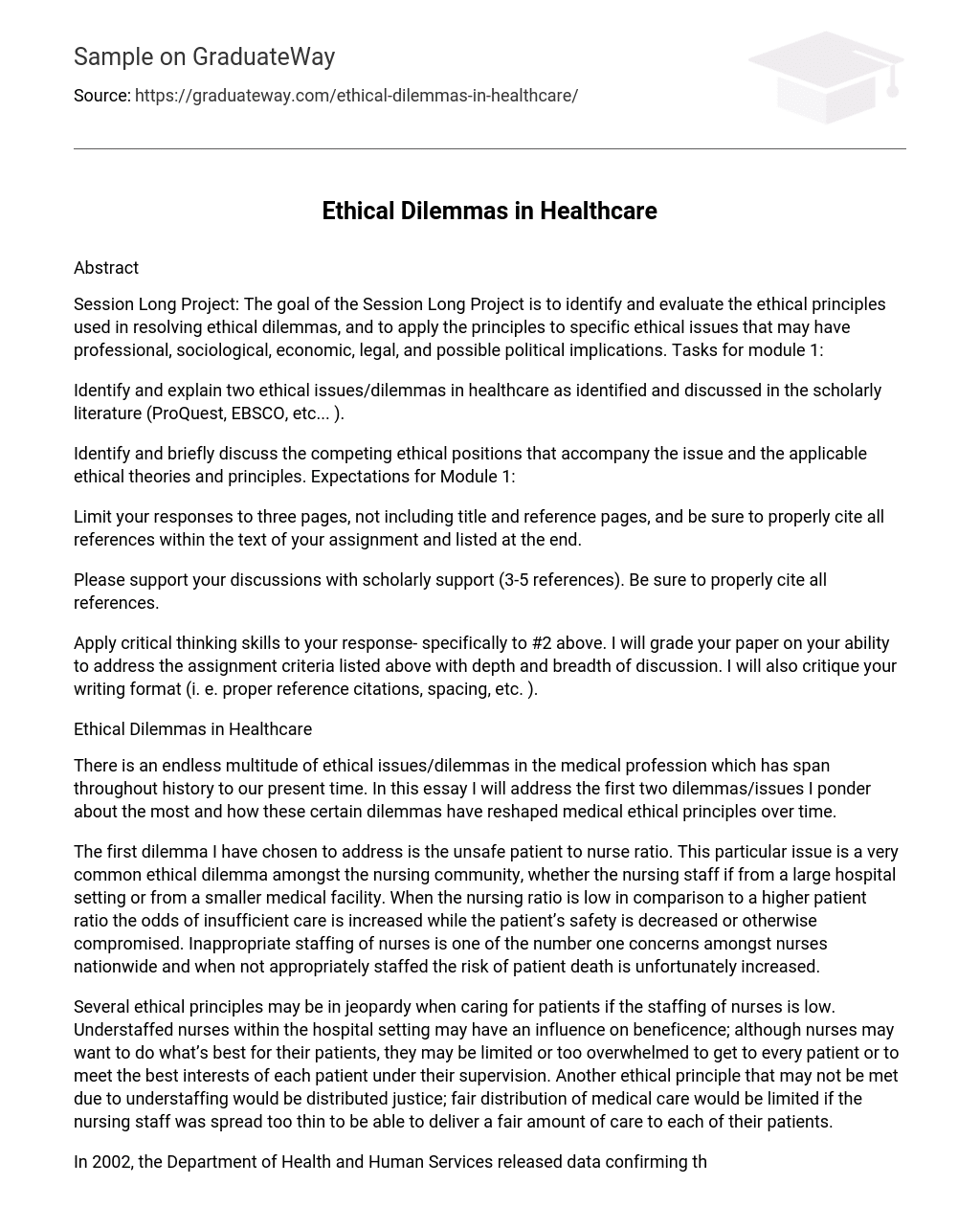Abstract
Session Long Project: The goal of the Session Long Project is to identify and evaluate the ethical principles used in resolving ethical dilemmas, and to apply the principles to specific ethical issues that may have professional, sociological, economic, legal, and possible political implications. Tasks for module 1:
Identify and explain two ethical issues/dilemmas in healthcare as identified and discussed in the scholarly literature (ProQuest, EBSCO, etc… ).
Identify and briefly discuss the competing ethical positions that accompany the issue and the applicable ethical theories and principles. Expectations for Module 1:
Limit your responses to three pages, not including title and reference pages, and be sure to properly cite all references within the text of your assignment and listed at the end.
Please support your discussions with scholarly support (3-5 references). Be sure to properly cite all references.
Apply critical thinking skills to your response- specifically to #2 above. I will grade your paper on your ability to address the assignment criteria listed above with depth and breadth of discussion. I will also critique your writing format (i. e. proper reference citations, spacing, etc. ).
Ethical Dilemmas in Healthcare
There is an endless multitude of ethical issues/dilemmas in the medical profession which has span throughout history to our present time. In this essay I will address the first two dilemmas/issues I ponder about the most and how these certain dilemmas have reshaped medical ethical principles over time.
The first dilemma I have chosen to address is the unsafe patient to nurse ratio. This particular issue is a very common ethical dilemma amongst the nursing community, whether the nursing staff if from a large hospital setting or from a smaller medical facility. When the nursing ratio is low in comparison to a higher patient ratio the odds of insufficient care is increased while the patient’s safety is decreased or otherwise compromised. Inappropriate staffing of nurses is one of the number one concerns amongst nurses nationwide and when not appropriately staffed the risk of patient death is unfortunately increased.
Several ethical principles may be in jeopardy when caring for patients if the staffing of nurses is low. Understaffed nurses within the hospital setting may have an influence on beneficence; although nurses may want to do what’s best for their patients, they may be limited or too overwhelmed to get to every patient or to meet the best interests of each patient under their supervision. Another ethical principle that may not be met due to understaffing would be distributed justice; fair distribution of medical care would be limited if the nursing staff was spread too thin to be able to deliver a fair amount of care to each of their patients.
In 2002, the Department of Health and Human Services released data confirming that nursing shortages already existed and the shortage would increase by up to 12 percent by 2010, increase up to 20 percent by 2015 and be at a staggering 29 percent by 2020. Luckily by 2003, federal legislation introduced the Registered Nurse Safe Staffing Act of 2003. This legislation was enacted to ensure that patients receive safe, quality nursing care in hospitals and other health care institutions.
This Act was utilized to amend the condition of participation in Medicare programs which establishes requirements for minimal registered nurse staffing levels for each shift and each unit of a hospital and or medical facility to ensure appropriate staffing levels for patient care. Additionally this act requires that medical facilities publically report their staffing information as well as protect any whistle-blower who may file a complaint regarding staffing issues. There have been several provisions to this act over the years since its introduction back in 2003 nd by continuing to improve this act has proved to save lives secondary to safely staffing nurses, not only in numbers but by experience levels as well.
The second dilemma I have chosen to address is inappropriate tasking. One example of inappropriate tasking would be to have new nurse placed in a setting where they are unfamiliar for instance in an emergency setting. When a nurse is placed in an unfamiliar setting the consequential ethical theory of patient care may be solely dependent upon the action or the inactions of a nurse in an unfamiliar setting.
Another example of inappropriate tasking would be when a nurse becomes over tasked and they start to inappropriately delegate their duties to a medical assistant whose developmental ethics have not yet matured to the level of the delegating nurse. Although in this latest situation the delegating nurse may believe he/she is morally just the principle ethics of it all would not be beneficial to the patient and an injustice of patient care would have occurred. The two issues I have listed in this essay could very well correspond together for better or for worse.
In the presence of a dwindling nursing staff, an overwhelmed nurse may feel the need to delegate his/hers duty to other personnel. If the delegated duties are given to a less qualified individual in good intentions the delegating individual may believe that the ethical realism has been met due to having to choose an option of delegation to serve the common good for all of their tasks. Although this is not a good practice one’s standards may think this is acceptable.
However, when acts are passed by federal legislation and put into place, the utilitarian theory will best serve the interest of all medical personnel involved in long term projections. Although ethical dilemmas and issues will continue to occur, the use of new acts, policies and continuing education to the medical population will aid in medical personnel having to deal with ethical issues of the future. In conclusion, both of the issues I have identified have made progress over the years due to legislation passing acts and local authorities in the medical field addressing new policies and procedures on the code of ethics in healthcare.





